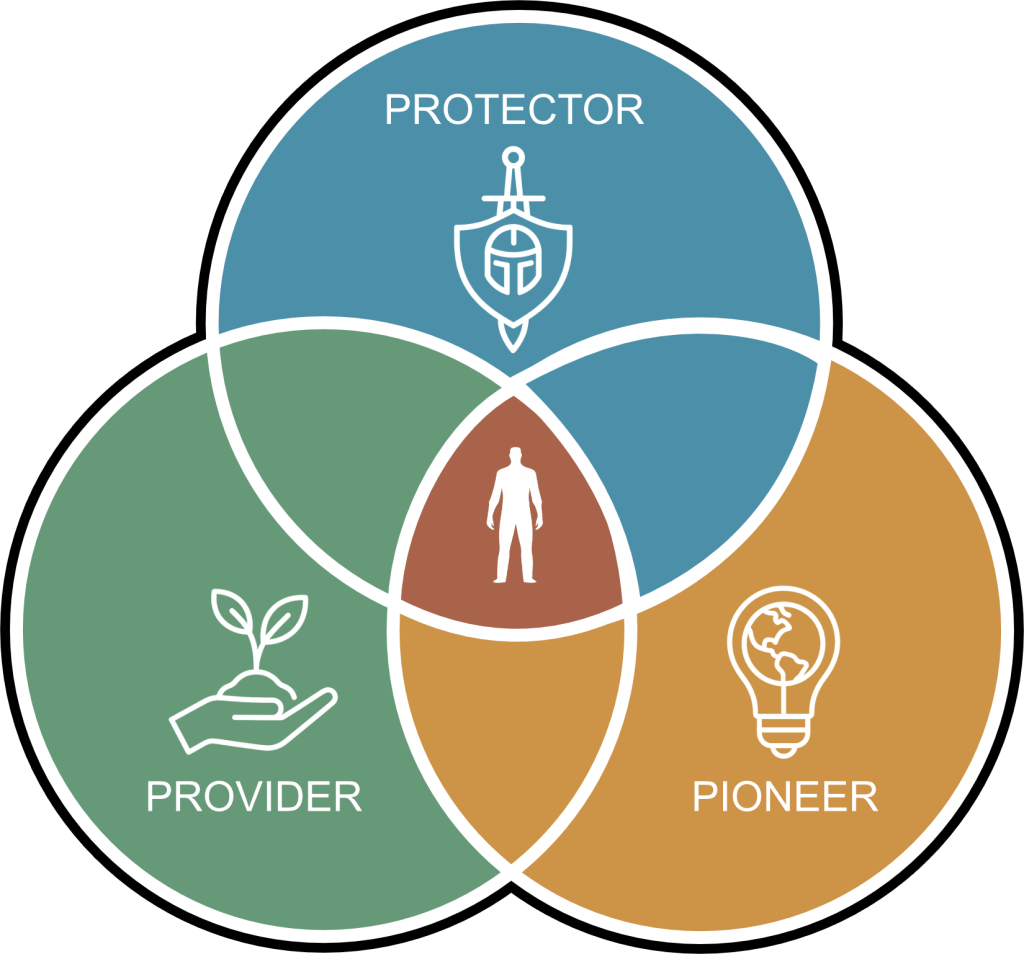
The Natural Man
For as long as men have walked the earth, they have carried with them an unspoken mandate. Across ages and civilizations, in villages, tribes, kingdoms, and nations, men have been called upon to fulfill roles that define not only their personal worth but the stability of the society around them. These roles are not arbitrary. They are not the invention of modern culture or passing trends. They are enduring functions of manhood that have echoed through time, rooted in what it means to live as a complete man.
The Natural Man is not a theory of nostalgia, nor a call to recreate some imagined golden age. It is a recognition that men are most whole when they embrace the work that has always been theirs: to protect, to provide, and to pioneer. These are not external labels applied by others. They are inner imperatives, the three tasks that men instinctively return to when asked who they are and what they do.
The Natural Man never acts in expectation of reward. His role is self-contained, chosen and carried out with full agency. Appreciation and procreation may follow, but they are responses from others, never the source of his direction. To depend upon them would be to surrender his freedom, to place his worth in the hands of those who cannot define him. The Natural Man stands complete in his own work. He protects, provides, and pioneers because that is who he is, not because of what he may gain. Whatever others give—or withhold—does not alter his path.
A man is not measured by possessions or applause, nor by how closely he conforms to temporary fashions. He is measured by his willingness to act in these three roles. When he neglects one entirely, he risks imbalance and frustration. When he embraces them, even imperfectly, he aligns himself with a rhythm of life that predates him and will outlast him.
This is the essence of the Natural Man. He protects. He provides. He pioneers. Everything else is detail.
The Benefits of Being a Natural Man
“When you disavow a part of yourself, you grant it unlimited power over you.”
 For generations, men have been pressured to conform to narrow roles: to work, to suppress, to endure without complaint. But psychology consistently shows that suppressing core aspects of identity leads to stress, poor health, and a sense of incompleteness. The Natural Man framework restores balance by recognising the three essential masculine roles—Protector, Provider, and Pioneer. Embracing each role yields lasting psychological, physical, and relational benefits.
For generations, men have been pressured to conform to narrow roles: to work, to suppress, to endure without complaint. But psychology consistently shows that suppressing core aspects of identity leads to stress, poor health, and a sense of incompleteness. The Natural Man framework restores balance by recognising the three essential masculine roles—Protector, Provider, and Pioneer. Embracing each role yields lasting psychological, physical, and relational benefits.
1. Integration of Self
Men who acknowledge and act upon all aspects of their nature—strength, provision, and innovation—develop stronger self-concept clarity. Research shows that people with a well-defined sense of identity experience less anxiety, greater resilience, and healthier relationships. Integration prevents inner conflict and reduces the risk of living in denial of one’s deeper drives.
2. Reduced Stress and Burnout
Chronic self-sacrifice—such as working endlessly without recognition of personal needs—correlates strongly with long-term stress, depression, and burnout. Studies on role strain demonstrate that when men are forced to over-invest in one role (usually the Provider), they often neglect personal growth and family bonds, leading to exhaustion. By balancing all three archetypes, a Natural Man avoids one-dimensional living and protects himself from the psychological toll of imbalance.
3. Authentic Living
Psychology has long supported the principle that authenticity—living true to one’s inner nature—produces greater life satisfaction. Men who consistently deny their instincts to protect, provide, or pioneer often feel alienated from themselves. By contrast, living authentically improves self-esteem, reduces depression, and fosters long-term purpose.
4. Resilience Through Meaning
Men who tie their actions to purpose—whether defending loved ones, building stability, or creating new paths—show greater resilience in the face of adversity. Viktor Frankl’s work on meaning demonstrated that individuals who connect their struggles to a higher sense of duty endure hardship with less psychological damage. The Natural Man gains strength by uniting his actions with meaning rather than mere survival.
5. Improved Relationships
When a man is complete, his relationships benefit. Suppressed drives often leak out as aggression, passivity, or withdrawal, damaging family and social bonds. By embracing all roles, a Natural Man interacts with others from a position of confidence and balance. He neither dominates nor withdraws, but contributes to his community with stability and clarity.
6. Psychological Freedom
Ignoring one’s strengths or weaknesses grants them “unlimited power,” as your quote states. Suppressed instincts often resurface in destructive ways: addiction, reckless behaviour, or quiet despair. Psychology recognises this as repression. By consciously engaging with all three elements of masculinity, men reclaim freedom from the shadows of unacknowledged needs.
7. Long-Term Fulfilment
The Natural Man avoids the trap of living only for the present or only for duty. He builds a life that balances strength, provision, and vision. Research consistently finds that men who live with balanced goals—relational, vocational, and personal—report higher long-term well-being than those who devote themselves solely to work or self-denial.
A man who denies his nature is a man divided. He spends his days fighting invisible battles against himself, never realising that the cure is not suppression but integration. Modern psychology confirms what instinct has always whispered: ignoring your needs does not make them disappear—it makes them stronger. When you disavow a part of yourself, you grant it unlimited power over you. To live as a Natural Man is to take back that power, to honor the Protector, Provider, and Pioneer within you, and to live as a whole being instead of a fractured one. If you feel the weight of exhaustion, emptiness, or aimlessness, the answer is not to abandon who you are but to embrace all of who you are. That is the Natural Man Journey. It is the path toward clarity, balance, and fulfilment—and it is waiting for you to take your first step.
References
Sheldon, K. M., & Elliot, A. J. (1999). Goal striving, need satisfaction, and longitudinal well-being: The self-concordance model. Journal of Personality and Social Psychology, 76(3), 482–497.
Ryan, R. M., & Deci, E. L. (2000). Self-determination theory and the facilitation of intrinsic motivation, social development, and well-being. American Psychologist, 55(1), 68–78.
Schaufeli, W. B., Leiter, M. P., & Maslach, C. (2009). Burnout: 35 years of research and practice. Career Development International, 14(3), 204–220.
Harter, S. (2002). Authenticity. In C. R. Snyder & S. J. Lopez (Eds.), Handbook of Positive Psychology (pp. 382–394). Oxford University Press.
Frankl, V. E. (1985). Man’s Search for Meaning. Washington Square Press.
Diehl, M., Owen, S. K., & Youngblade, L. M. (2004). Agency and communion attributes in adults’ spontaneous self-representations. International Journal of Behavioral Development, 28(1), 1–15.

When the Mob Decides You’re a Villain
When society turns disagreement into a death sentence, modern men scramble to hide, apologize, and conform, but it never saves them. The Natural Man stands firm because his roles—Protector, Provider, Pioneer—don’t change with the mob’s mood. He doesn’t seek approval to live out his purpose, which is why he remains steady while others collapse.
Free Membership Membership Required
You must be a Free Membership member to access this content.

The Rewards of Being a Natural Man
Most men live their lives straining after rewards that are not really theirs to control. Recognition, reproduction, status, applause—these are the external carrots dangled in

The Natural Man Versus the Modern Man
The Natural Man: He does not wait for permission, nor does he outsource his identity to a committee. He is defined by what he does, not by what others permit him to do, and his doing is anchored in three ancient roles: the Protector, the Provider, and the Pioneer. These roles are not costumes he puts on to win applause; they are disciplines by which he shapes himself and serves others. They are not theories. They are actions.

Relationships That Multiply: When One Times One Equals More Than Two
A transactional relationship is exhausting. Each day becomes a silent audit. Did I do enough to deserve affection? Did she do enough to deserve my sacrifice? Did I provide enough money? Did she give enough recognition? The ledger never balances, because human effort is too messy to be perfectly measured.

The Shame of Wanting to Be Respected
It didn’t used to be shameful to want respect. It was expected. Taught. Modeled. Earning a reputation was part of becoming a man. You worked for it. You protected it. You lived in such a way that your name meant something when people said it.
But somewhere along the way, men were told that if they desired respect, they must be chasing power. That to want recognition meant you were compensating. That a man asking to be valued must secretly be weak.

The Ache to Be Useful: Not Just Employed, But Needed
A man can have a job, even a good one, and still feel hollow inside. The paycheck may cover the bills, the hours may be



